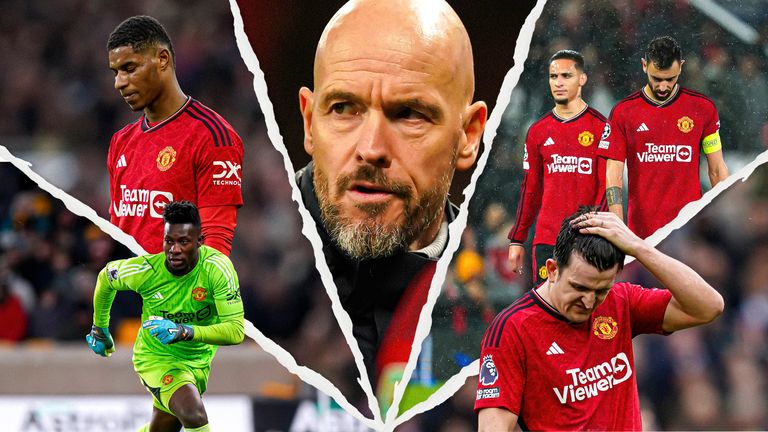
In a shocking turn of events, Manchester United has officially parted ways with manager Erik ten Hag, marking a turbulent end to a tenure that promised much but ultimately delivered disappointment. The decision has sent ripples through the football world, sparking debate over where exactly things went wrong for the Dutchman at Old Trafford.
The Promising Start
When Ten Hag was appointed in April 2022, there was a palpable sense of optimism. Known for his tactical acumen and success at Ajax, where he led the team to a domestic double and the UEFA Champions League semifinals, he was seen as the man to restore Manchester United’s former glory. His appointment was celebrated, with fans hoping his disciplined approach and attacking philosophy would breathe new life into a squad that had underperformed in recent seasons.
Ten Hag’s first season yielded some successes, including a League Cup victory and a respectable finish in the Premier League. However, the foundations of success began to show cracks as the season progressed, raising questions about his ability to manage a club of United’s stature.
Inconsistent Performances
One of the primary issues during Ten Hag’s reign was inconsistency. The team often delivered lackluster performances, especially against lower-tier teams. Key fixtures that should have been straightforward often turned into frustrating draws or unexpected losses. Matches against teams like Brentford and Brighton highlighted a troubling trend: a lack of tactical adaptability and failure to motivate players in crucial moments. This inconsistency became a hallmark of Ten Hag’s tenure, leading fans and analysts to question whether he could inspire a winning mentality.
Moreover, his reliance on a core group of players became problematic. Injuries to stars like Marcus Rashford and Bruno Fernandes exposed the lack of depth in the squad. Ten Hag’s insistence on a specific playing style left the team vulnerable when key players were unavailable, revealing flaws in his squad management.
Tactical Missteps
While Ten Hag’s tactical philosophy initially seemed promising, it became evident that his strategies often lacked flexibility. His preference for a possession-based game sometimes led to over-elaboration in midfield, resulting in loss of possession in dangerous areas. Defensively, the team appeared uncoordinated, especially against teams employing a high press, leading to a number of high-profile defeats.
Critics pointed to his failure to adapt mid-game as a major shortcoming. In key matches, such as the defeats to rivals like Liverpool and Manchester City, Ten Hag appeared to stick rigidly to his game plan despite glaring deficiencies in execution. This inflexibility raised questions about his ability to read games and respond effectively to in-game situations—a crucial skill for any top manager.
Player Management and Relations
Another significant aspect of Ten Hag’s downfall was his player management. While he had a reputation for being a strict disciplinarian, reports suggested that his relationships with some key players were strained. This was particularly evident with players like Jadon Sancho and Antony, who struggled to find form and consistently featured in the starting lineup despite poor performances.
Furthermore, Ten Hag’s handling of the Cristiano Ronaldo situation was widely criticized. His decision to bench the club legend during pivotal matches alienated a segment of the fanbase and disrupted team morale. The fallout from Ronaldo’s departure loomed over the squad, with many questioning whether Ten Hag had the necessary interpersonal skills to manage such high-profile talents.
Injuries and Squad Depth
Injuries played a significant role in Ten Hag’s struggles, but they were not entirely unavoidable. The squad’s lack of depth was a concern that many had flagged even before his arrival. The failure to adequately strengthen the squad during transfer windows ultimately came back to haunt him. With limited options at his disposal, Ten Hag’s tactical plans often fell apart, revealing a lack of foresight in building a competitive team.
The Final Straw
Despite the initial promise, it became clear that Ten Hag’s methods were not translating into consistent results on the pitch. A series of poor performances culminated in a humiliating exit from the FA Cup and a lackluster start to the current Premier League season. The board’s patience eventually ran thin, leading to his sacking—a move that, while controversial, underscores the relentless pressure to succeed at a club like Manchester United.
Looking Ahead
As Manchester United searches for its next manager, the focus will inevitably shift to the future. The club must learn from the mistakes of Ten Hag’s tenure, ensuring that whoever steps into the role has not only tactical expertise but also the ability to manage a diverse and high-profile squad. The road ahead is uncertain, but one thing is clear: the legacy of Erik ten Hag’s time at Old Trafford will be one of missed opportunities and unfulfilled potential.




